新目标英语九年级期末复习资料:Units 9-10
- 格式:doc
- 大小:36.50 KB
- 文档页数:3
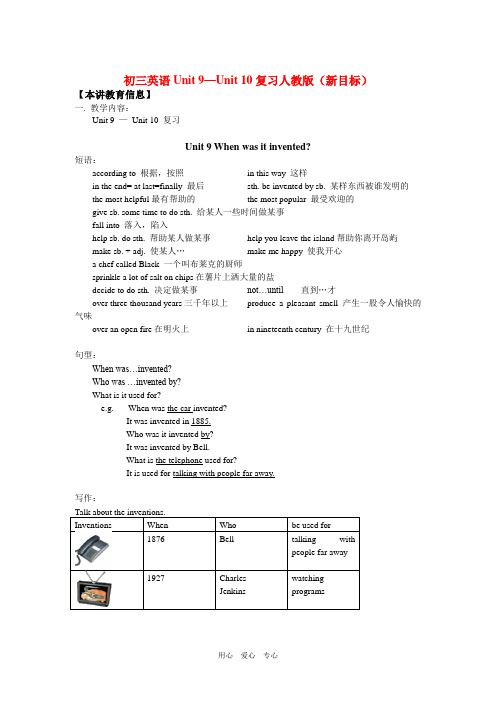
初三英语Unit 9—Unit 10复习人教版(新目标)【本讲教育信息】一. 教学内容:Unit 9 —Unit 10 复习Unit 9 When was it invented?短语:according to 根据,按照in this way 这样in the end= at last=finally 最后sth. be invented by sb. 某样东西被谁发明的the most helpful最有帮助的the most popular 最受欢迎的give sb. some time to do sth. 给某人一些时间做某事fall into 落入,陷入help sb. do sth. 帮助某人做某事help you leave the island帮助你离开岛屿make sb. + adj. 使某人…make me happy 使我开心a chef called Black 一个叫布莱克的厨师sprinkle a lot of salt on chips在薯片上洒大量的盐decide to do sth. 决定做某事not…until直到…才over three thousand years三千年以上produce a pleasant smell 产生一股令人愉快的气味over an open fire在明火上in nineteenth century 在十九世纪句型:When was…invented?Who was …invented by?What is it used for?e.g. --When was the car invented?-- It was invented in 1885.-- Who was it invented by?-- It was invented by Bell.-- What is the telephone used for?-- It is used for talking with people far away.写作:InventionsFill in the blanks and then choose one to make a report.The__________ was invented in ________. It was invented by _________. It is used for ________________.语法:被动语态一. 被动语态的时态及结构(以动词do为例)1. 结构:主语+ be + 过去分词(过去分词不变,所有人称,数,时态的变化,都体现在助动词be的变化上。
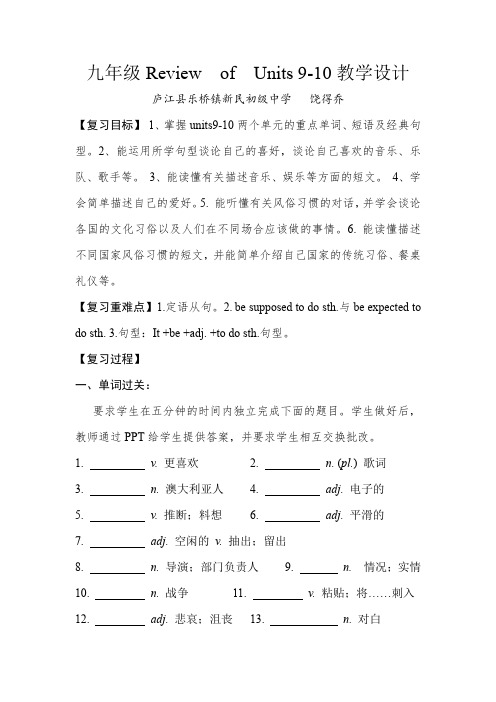
九年级Review of Units 9-10教学设计庐江县乐桥镇新民初级中学饶得乔【复习目标】1、掌握units9-10两个单元的重点单词、短语及经典句型。
2、能运用所学句型谈论自己的喜好,谈论自己喜欢的音乐、乐队、歌手等。
3、能读懂有关描述音乐、娱乐等方面的短文。
4、学会简单描述自己的爱好。
5. 能听懂有关风俗习惯的对话,并学会谈论各国的文化习俗以及人们在不同场合应该做的事情。
6. 能读懂描述不同国家风俗习惯的短文,并能简单介绍自己国家的传统习俗、餐桌礼仪等。
【复习重难点】1.定语从句。
2.be supposed to do sth.与be expected to do sth. 3.句型:It +be +adj. +to do sth.句型。
【复习过程】一、单词过关:要求学生在五分钟的时间内独立完成下面的题目。
学生做好后,教师通过PPT给学生提供答案,并要求学生相互交换批改。
1. v. 更喜欢2. n. (pl.) 歌词3. n. 澳大利亚人4. adj. 电子的5. v.推断;料想6. adj.平滑的7. adj. 空闲的v.抽出;留出8. n. 导演;部门负责人9. n. 情况;实情10. n. 战争11. v.粘贴;将……刺入12. adj.悲哀;沮丧13. n.对白14. n.戏;剧15. v.关闭;关上16. v.反映;映出17. v. 同情n. 遗憾18. n.主人v.掌握19. v. 回忆起;回想起20. n.伤口;创伤v.使受伤21. n.风俗22. v. 鞠躬23. n. &v. 吻24. n.首都25. n. 护照26. n. 粉笔27. n. 黑板28. adj. 北方的29. n.海岸30. v. 敲n.敲击声31. adj. 东方的32. adj. 有……价值(的)33. n. 方式;方法(pl.)礼貌;礼仪34. adj.空的35. adj.基本的;基础的36. n.&v. 交换37. n. (外)孙女38. v.表现;举止39. prep. 除……之外conj. 除了;只是40. n. 肘41. adv. 逐步地;渐进地二、短语归纳:要求学生在五分钟的时间内独立完成下面的题目。
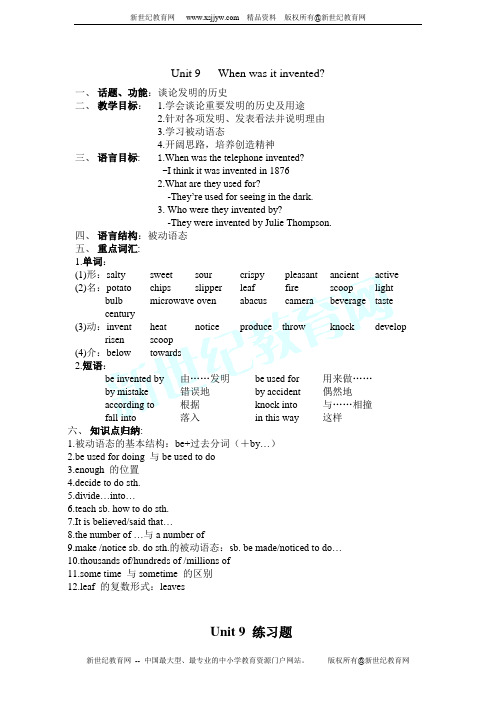
Unit 9 When was it invented?一、话题、功能:谈论发明的历史二、教学目标: 1.学会谈论重要发明的历史及用途2.针对各项发明、发表看法并说明理由3.学习被动语态4.开阔思路,培养创造精神三、语言目标: 1.When was the telephone invented?-I think it was invented in 18762.What are they used for?-They’re used for seeing in the d ark.3. Who were they invented by?-They were invented by Julie Thompson.四、语言结构:被动语态五、重点词汇:1.单词:(1)形:salty sweet sour crispy pleasant ancient active(2)名:potato chips slipper leaf fire scoop lightbulb microwave oven abacus camera beverage tastecentury(3)动:invent heat notice produce throw knock developrisen scoop(4)介:below towards2.短语:be invented by 由……发明be used for 用来做……by mistake 错误地by accident 偶然地according to 根据knock into 与……相撞fall into 落入in this way 这样六、知识点归纳:1.被动语态的基本结构:be+过去分词(+by…)2.be used for doing 与be used to do3.enough 的位置4.decide to do sth.5.divide…into…6.teach sb. how to do sth.7.It is believed/said that…8.the number of …与a number of9.make /notice sb. do sth.的被动语态:sb. be made/noticed to do…10.thousands of/hundreds of /millions of11.some time 与sometime 的区别12.leaf 的复数形式:leavesUnit 9 练习题一、情景交际:从方框中选出相应的答语()1. When was the computer invented?()2. Who was the TV invented by?()3. How were the potato chips invented?()4. What happened to you ?()5. What are they used for?A. It’s invented by Bell.B. They were invented by mistake.C. I think it was invented in 1976.D. They are used for seeing in the dark.E. I had a really bad morning.F. No, never.二、用所给词的正确形式填空。

Units 9—10知识点讲解某某考点聚焦1、prefer(=like better)搭配:(1)2、suppose的用法:(1) suppose + that 从句,表示“猜测;假定”。
如: You can suppose that A equals B. 你可以假定A等于B。
(2) suppose +名词 / 代词 + to be...,表示“认为……是……”。
如:Many people suppose him to be over 50.(3) suppose用于祈使句中,表示“让……”。
如:Suppose we go for a swim. (= Let's go for a swim.) 让我们去游泳吧。
be supposed to do的用法:(4)be supposed to... 其中to是动词不定式符号,不是介词,其后要跟动词原形。
当be supposed to... 的主语是“人”时,意为“应该……”;“被期望……”,它可以用来表示劝告、建议、义务、责任等,相当于情态动词should。
(5)当be supposed to... 的主语是“物”时,它表示“本应;本该”,用于表示“某事本应该发生而没有发生”。
如:The new laws are supposed to prevent crime. 这些新法令本应该起到防止犯罪的作用。
(6)be supposed to后面接“have + 过去分词”时,表示“本应该做某事而没做”。
如:You are supposed to have handed in your homework by now.现在你应该已经把作业交上来了。
(7)be supposed to... 的否定结构为be not supposed to...,它常用于口语中,意为“不被许可;不应当”。
如:She was not supposed to be angry about that. 她本不该为那件事而生气的。
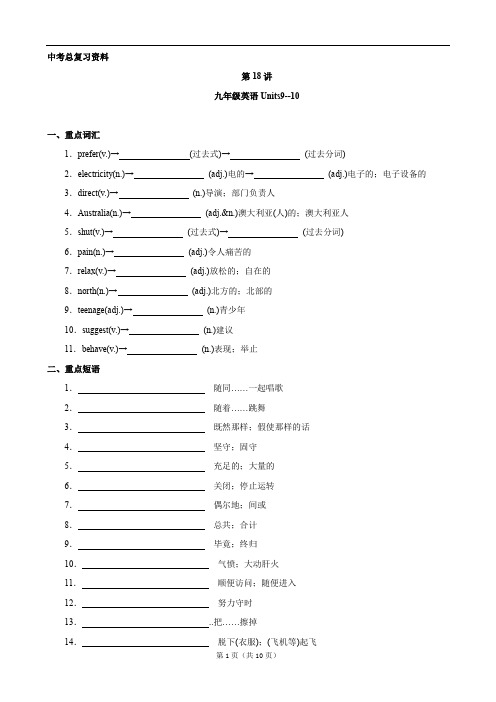
中考总复习资料第18讲九年级英语Units9--10一、重点词汇1.prefer(v.)→(过去式)→(过去分词)2.electricity(n.)→(adj.)电的→(adj.)电子的;电子设备的3.direct(v.)→(n.)导演;部门负责人4.Australia(n.)→(adj.&n.)澳大利亚(人)的;澳大利亚人5.shut(v.)→(过去式)→(过去分词)6.pain(n.)→(adj.)令人痛苦的7.relax(v.)→(adj.)放松的;自在的8.north(n.)→(adj.)北方的;北部的9.teenage(adj.)→(n.)青少年10.suggest(v.)→(n.)建议11.behave(v.)→(n.)表现;举止二、重点短语1.随同……一起唱歌2.随着……跳舞3.既然那样;假使那样的话4.坚守;固守5.充足的;大量的6.关闭;停止运转7.偶尔地;间或8.总共;合计9.毕竟;终归10.气愤;大动肝火11.顺便访问;随便进入12.努力守时13...把……擦掉14.脱下(衣服);(飞机等)起飞15.特地;格外努力16.使(某人)感到宾至如归17.习惯于三、重点句型1.我喜欢可以跟着跳舞的音乐。
I like music I can .2.他喜欢能演奏不同种类音乐的音乐家。
He likes musicians play different kinds of music.3.当我心情不好或疲惫时,我更偏爱看那些能使我高兴起来的电影。
When I'm down or tired,I movies that can me .4.那是我听到过的最感人的音乐。
It was one of of music that I've ever .5.我感到太恐怖以至于不敢独自去看。
I'm scared watch them .6.你应该握手。
You to shake hands.7.当你第一次见到某人时你应该做什么?你不应该行亲吻礼。
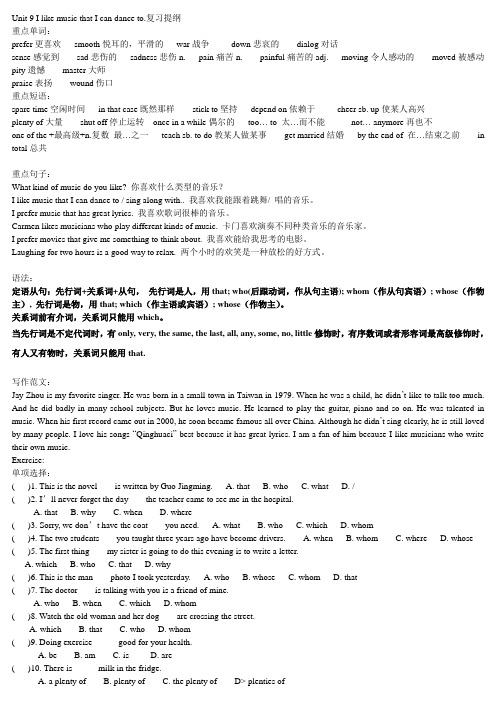
Unit 9 I like music that I can dance to.复习提纲重点单词:prefer更喜欢smooth悦耳的,平滑的war战争down悲哀的dialog对话sense感觉到sad悲伤的sadness悲伤n. pain痛苦n. painful痛苦的adj. moving令人感动的moved被感动pity遗憾master大师praise表扬wound伤口重点短语:spare time空闲时间in that case既然那样stick to坚持depend on依赖于cheer sb. up使某人高兴plenty of大量shut off停止运转once in a while偶尔的too… to 太…而不能not… anymore再也不one of the +最高级+n.复数最…之一teach sb. to do教某人做某事get married结婚by the end of 在…结束之前in total总共重点句子:What kind of music do you like? 你喜欢什么类型的音乐?I like music that I can dance to / sing along with.. 我喜欢我能跟着跳舞/ 唱的音乐。
I prefer music that has great lyrics. 我喜欢歌词很棒的音乐。
Carmen likes musicians who play different kinds of music. 卡门喜欢演奏不同种类音乐的音乐家。
I prefer movies that give me something to think about. 我喜欢能给我思考的电影。
Laughing for two hours is a good way to relax. 两个小时的欢笑是一种放松的好方式。
语法:定语从句:先行词+关系词+从句,先行词是人,用that; who(后跟动词,作从句主语); whom(作从句宾语); whose(作物主), 先行词是物,用that; which(作主语或宾语); whose(作物主)。
九年级(全)Unit9—Unit10一、重点单词1.adj.酸的 2. adj.古代的,古老的 3. v.被遗留4. v.注意到5. n.世纪,百年6. v.敲,击,碰撞7. n.篮,筐8. n.金属9. prep.&adv.在…..下面,低于10. v.加热,使变热11. v.发明,创造12. adj.活动的,活泼的13. v.划分,分开14. v.上升15. v.冲,奔16. v.锁,锁上17. adj&v.空的,排空,倒出18. adj.极其疲惫的,筋疲力竭的19. v.嫁,娶,与……结婚二、词汇拓展1invent(v.)→(n.)发明家→(n.)发明2.embarrass(v.)→ (adj.)尴尬的→ (adj.)令人尴尬的3.operate(v.)→ (n..)手术4.salt(n.)→ (adj.)咸的,含盐的5.produce(v.)→(n.)产品6.please(v.)→ (adj.)满意的,令人愉快的7.mix(v.)→(n.)混合,混合物8.create(v.)→(adj.)有创造力的9.wood(n.)→ (adj.)木制的10.develop(v.)→ (n.)发展11.popular(adj.)→(n.)普及,流行12.farm(n.)→(n.)农夫13.throw(v.)→ (过去式)投,掷→ (过去分词)投,掷14.annouce(v.)→ (n.)布告,公告 15.convince(v.)→(adj.)令人信服的三、重点短语1. 根据,按照2. 跑掉,离开3. 露面4. 停止运转5. 愚人节6. 激起,引起7. 卖完,售光8. 一片,一块9. 习惯做10. 错误地11. 偶然地12. 落入,陷入13. 这样14. 与…相撞15. 到…时候16. 发出响声17. 准时,按时18. 结婚四、重点句子1.我认为电话在小汽车之前发明。
我认为电脑在计算器之后发明。
九年级英语unit9-10知识点梳理九年级英语Unit 9-10知识点梳理Unit 9: Traveling在我们的生活中,旅行成为了一种越来越受欢迎的方式。
无论是在国内还是国外,旅行给我们带来了难忘的经历和宝贵的记忆。
在九年级英语课程的第9单元中,我们将一起学习关于旅行的词汇和语法。
首先,我们将了解一些关于旅行方式的词汇。
例如,我们可以选择 "take a flight"坐飞机、 "take a train"坐火车、"take a bus"坐公共汽车,或者 "take a taxi"坐出租车。
当我们想去一个地方时,我们也可以 "go on foot" 步行,或者 "ride a bike" 骑自行车。
除了交通方式,我们还需要了解关于旅行目的地的词汇。
例如,我们可以去海滩度假(beach holiday)、登山(hike)、参观古迹(visit historical sites),或者去夜市体验当地文化(experience local culture)。
这些词汇可以帮助我们描述和讨论我们的旅行计划。
在这一单元,我们还将学习表示位置的介词短语。
例如,如果我们在机场等朋友,我们可以说 "I'm waiting for my friend at the airport"。
而当我们到达目的地时,我们可以说 "I'm in Beijing"或者"I'm at the beach"。
在语法方面,我们将学习不定式的用法。
不定式可以在句子中作为名词、形容词或副词使用。
例如,"To learn English well is my goal"中的不定式 "to learn English well"作为名词,充当了主语。
unit 9 I like music that I can dance to 短语great lyrics很棒的歌词sing along with 跟着一起唱too loud 太大声了a famous musician一位著名的音乐家quiet and slow songs安静而缓慢的歌曲electronic music电子音乐smooth music 流畅的音乐spare time 业余时间serious movies严肃的电影scary movies恐怖电影World War Ⅱ第二次世界大战stick to 坚持depend on 依赖cheer up使高兴起来have a happy ending有一个快乐的结局solve problems解决问题a good way to relax一种很好的放松方式dramas or documentaries戏剧或纪录片plenty of 大量的a certain subject某个主题I don’t mind我不介意shut off 关掉sit back 坐好save the world 拯救世界in time 及时not...anymore不再……once in a while 偶尔different kinds of 各种各样的intelligent 聪明的sing the words clearly 把歌词唱清楚your favorite band你最喜欢的乐队the unusual clothes 不寻常的衣服the piece of music这首乐曲a concert of folk music 一场民间音乐会sense a strong sadness and pain感受到强烈的悲伤和痛苦look up 查阅be known for因……而闻名his musical ability 他的音乐才能a serious illness一种严重的疾病in this way 通过这种方式become blind变瞎during his lifetime在他的一生中by the end of 到……结束时in total总共the great master这位伟大的大师China’s national treasures中国的国宝paint a picture画一幅画one’s own life某人的生活recall the wounds回忆创伤touch our hearts触动我们的心in the past在过去many instruments许多乐器spread joy传播欢乐describe the future描述未来unit 10 You’re supposed to shake hands.短语for the first time第一次be supposed to 应该talk about customs谈论风俗shake hands握手bow鞠躬arrive late迟到the wrong way 错误的方式next time下次make some mistakes犯一些错误the welcome party 欢迎会greet each other互相问候as soon as一…就…foreign students外国学生do the same thing 做同样的事find out 查明to one’s surprise 令某人惊讶的是rush around到处奔波a bit 一点the side of …的一边walk around四处走动on time 准时the capital of …的首都get mad生气avoid heavy traffic避开交通高峰keep other waiting 让别人等待something interesting 一些有趣的事no big deal没什么大不了的in Switzerland在瑞士wear a suit and tie穿西装打领带wear jeans穿牛仔裤go aboard出国your passport你的护照clean the chalk off把粉笔擦干净European countries欧洲国家take off your gloves摘下手套social situations社交场合the best ways to 最好的方式another culture另一种文化an empty bowl一个空碗basic table manners基本的餐桌礼仪the biggest challenge最大的挑战host family 寄宿家庭long-term memory长期记忆an exchange program 一个交换项目go out of 走出no reason没有理由a bit nervous有点紧张how to behave 如何表现get used to 习惯on the plate 在盘子里a pen pal一个笔友be excited about 对…感到兴奋some suggestions and advice一些建议和忠告look forward to doing sth.期待做某事show up 出现a fine-dining restaurant一家高档餐厅unit 9知识点1.prefer的用法prefer是及物动词,=like better “更喜欢、比较喜欢”固定搭配:prefer (doing) A to (doing) B “喜欢A胜过B、比起B来更喜欢A”prefer to do sth. rather than do sth.宁愿做某事,而不愿意做某事翻译:(1)比起桔子来我们更喜欢苹果。
Unit 9. When was it invented?
1.invent V. 发明invention N. 发明inventor N.发明家,发明者
2.be used for被用来(后接V-ing) = be used to 被用来(后接V原)
be used by 被…(人)用be used as 被当作…来用
3.notice sb do sth注意到某人做某事(表示注意到动作的全过程)
notice sb doing sth注意到某人正在做某事(表示注意到动作正在进行)
4.taste V.尝,品尝N.味道,风味
5.by accident偶然地,意外地,阴差阳错地
by mistake错误地,失误地,无意地
6.fall into掉进,落入
7.in this way用这种方法,这样
8.in 1950 在1950年in the 1950s 在20世纪50年代
9.century 世纪,百年(是可数名词,其复数形式是centuries, “在…世纪”应在其前面用序数词,如: the 19th century )
10.divide … into…把…分成…
11.knock into 与…相撞knock at/on the door敲门
12.It is believed that人们相信\认为
It is said that据说It is reported that 据报道
13.本单元的语法(被动语态)难点:
①使役动词和感官动词(一感二听三让四看)在变成被动语态时,后面的动词前要带to:
The teacher made me read the article.
→I was made to read the article (by the teacher).
②含有双宾语的主动句变成被动句时,有两种改法:
He gave me a book yesterday.
→I was given a book (by him)yesterday.
→A book was given to me (by him) yesterday.
①部分感官系动词(feel, look, sound, smell, taste)及sell(“卖”得好坏),write, wash等用主动语态来表示被动语态,如:
The dress feels comfortable. 那条裙子摸起来真舒服。
The fish my mother cooked smelled delicious. 我妈妈做的鱼闻起来真香。
Good medicine tastes bitter to the mouth.良药苦口。
His book sells well. 他的书卖得很好。
④有些词如arrive(到达), happen=take place(发生), die(死), belong to(属于)等没有被动语态:
A car accident happened to him yesterday. 昨天他发生了一场车祸。
His grandpa has died.
Unit 10.
By the time I got outside, the bus had already left.
1.by the time到…时候,到…之前
2.go off发出响声
3.run off迅速离开,跑掉
4.on time准时(表示做某事刚好与约定的时间一致,不早不晚)
in time及时(表示动作在规定的时间内或比规定的时间提前发生)
5.break down停止运转,出故障
6.show up出席,露面
7.set off激起,引起
8.和某人结婚marry sb= get married to sb(表动作) be married to(表状态)
9.happen 发生(偶然)
take place 发生(有安排,有计划)
10. sell out 卖完
11. a piece of 一片,一块,一张,一条,一份
12. make it 成功
13. give sb a ride 让某人搭顺风车
14. 忘记leave (后接地点)forget (不接地点)
15. wake up 醒来,叫醒
16. get dressed 穿衣
17. stop doing sth停止做某事(停止手头上正在做的事情)
stop to do sth 停下来去做某事(停止手头上正在做的事情去做另一件事)
18. 本单元的语法(过去完成时)难点:
①过去完成时表示在过去某一时刻以前已经完成的动作,它表示动作发生的时间是“过去的过去”。
这是一种相对应的时态,即其相对于一般过去时,没有一般过去时也就没有过去完成时。
构成:助动词had+动词的过去分词
②与之连用的短语:for+时间段,since+时间点,by the time+从句,how long, when, before, by the end of,by短语等
③巩固练习:用所给词的适当形式填空
A.By the end of last year, we _________________(finish) the work.
B.I met Anna last Sunday. I _______________(not see) her since we left school.
C.By 1995, he ________________(work) in that factory for 5 years.
D.Amy told me that she _________________(hear) of the good news.
E.Mary didn’t want to come to the cinema with us because she _____(see)the film before.
F.She thanked me for what I __________________(do)for her son.。